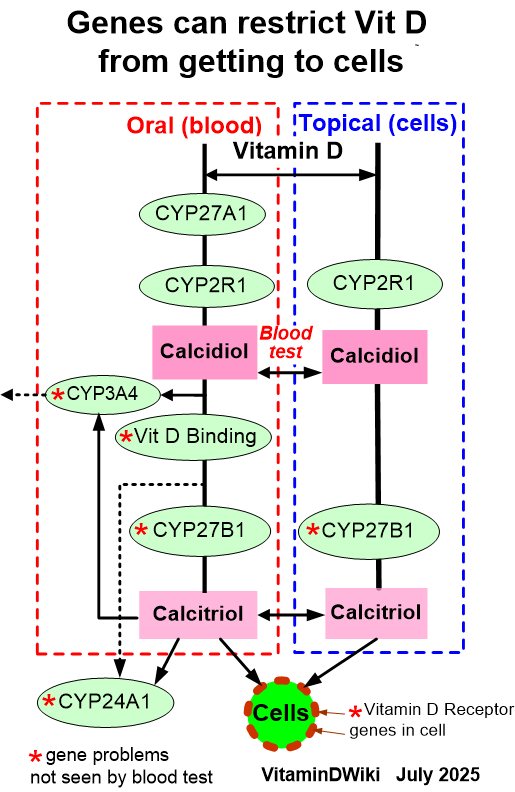Alzheimer's and Parkenson's risk should decrease if increase Vitamin D Receptor activation
See related in VitaminDWiki
2X higher risk of Alzheimer’s if poor Vitamin D Receptor – Meta-analysis June 2021
Alzheimer's 9X more likely in women with a poor Vitamin D receptor – Sept 2022
Alzheimer’s associated with Vitamin D and Vitamin D receptor – video and pdf – Aug 2018
Parkinson’s disease 1.6X more likely if a poor Vitamin D Receptor – meta-analysis Jan 2020
Parkinson’s risk increased 2 to 7 times depending on Vitamin D Receptor – Sept 2016
Liposomal Resveratrol seems best for the brain, might also fight MS Amazon
Resveratrol - liposomal may be best form to increase cellular Vitamin D - Feb 2023
Resveratrol improves health (Vitamin D receptor, etc.) - many studies
Resveratrol fights Parkinson, Alzheimers, Diabetes, Cardiovascular, ALS, Stroke, etc.– Nov 2018
Glutathione fights Parkinson's Disease - May 2024
The founder of VitaminDWiki is taking both Liposomal Resveratrol and Glutathione
Glutathione improves many of the genes that restrict Vitamin D from getting to cells
 click on chart for details
click on chart for details
25 "many studies" in the Vitamin D Receptor category
The list is automatically updated
{LIST()}
The Vitamin D Receptor as a Potential Target for the Treatment of Age-Related Neurodegenerative Diseases Such as Alzheimer’s and Parkinson’s Diseases: A Narrative Review
Cells Volume 12 Issue 4 10.3390/cells12040660
by Władysław Lasoń *,Danuta Jantas,Monika Leśkiewicz,Magdalena Regulska and Agnieszka Basta-Kaim
Maj Institute of Pharmacology, Polish Academy of Sciences, Dept. of Experimental Neuroendocrinology
The vitamin D receptor (VDR) belongs to the nuclear receptor superfamily of transcription factors. The VDR is expressed in diverse brain regions and has been implicated in the neuroprotective, antiaging, prosurvival, and anti-inflammatory action of vitamin D. Accordingly, a relationship between vitamin D insufficiency and susceptibility to neurodegenerative diseases has been suggested. However, due to the multitargeted mechanisms of vitamin D and its often overlapping genomic and nongenomic effects, the role of the VDR in brain pathologies remains obscure. In this narrative review, we present progress in deciphering the molecular mechanism of nuclear VDR-mediated vitamin D effects on prosurvival and anti-inflammatory signaling pathway activity within the central nervous system. In line with the concept of the neurovascular unit in pathomechanisms of neurodegenerative diseases, a discussion of the role of the VDR in regulating the immune and vascular brain systems is also included. Next, we discuss the results of preclinical and clinical studies evaluating the significance of vitamin D status and the efficacy of vitamin D supplementation in the treatment of Parkinson’s and Alzheimer’s diseases, emphasizing the possible role of the VDR in these phenomena. Finally, the associations of some VDR polymorphisms with higher risks and severity of these neurodegenerative disorders are briefly summarized.
